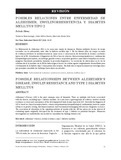Mostrar el registro sencillo del ítem
Posibles relaciones entre enfermedad de Alzheimer, Insulinorresistencia y Diabetes Mellitus Tipo 2
| dc.rights.license | http://creativecommons.org/licenses/by-nc-sa/3.0/ve/ | |
| dc.contributor.author | Hómez de Delgado, Belinda | |
| dc.date.accessioned | 2017-03-23T22:19:23Z | |
| dc.date.available | 2017-03-23T22:19:23Z | |
| dc.date.issued | 2017-02 | |
| dc.identifier.issn | 1690-3110 | |
| dc.identifier.uri | http://www.saber.ula.ve/handle/123456789/43255 | |
| dc.description.abstract | La Enfermedad de Alzheimer (EA) es la causa más común de demencia. Existen múltiples factores de riesgo asociados con la enfermedad, entre ellos la diabetes mellitus tipo 2. En los últimos años un cuerpo creciente de evidencia involucra la insulinorresistencia como causa y consecuencia del desarrollo de lesiones cerebrales típicas de la EA. Actualmente el diagnóstico de EA se basa en criterios clínicos neuropsiquiátricos y confirmación histopatológica post morten; sin embargo, grandes avances en pruebas genéticas, marcadores bioquímicos y neuro- imágenes funcionales permitirán aumentar la precisión diagnóstica. La asociación de alteraciones en la vía de señalización de la insulina con la EA ha dado origen al interés de evaluar agentes originalmente desarrollados para el tratamiento de la diabetes tipo 2 como potenciales terapias. Sin duda aún se requieren numerosas investigaciones que permitan consolidar los hallazgos hasta ahora encontrados. | es_VE |
| dc.language.iso | es | es_VE |
| dc.rights | info:eu-repo/semantics/openAccess | |
| dc.subject | Enfermedad de Alzheimer | es_VE |
| dc.subject | Insulinorresistencia | es_VE |
| dc.subject | Diabetes mellitus tipo 2 | es_VE |
| dc.title | Posibles relaciones entre enfermedad de Alzheimer, Insulinorresistencia y Diabetes Mellitus Tipo 2 | es_VE |
| dc.title.alternative | Possible relationships between Alzheimer’s disease, Insulin Resistance and Type 2 Diabetes Mellitus | es_VE |
| dc.type | info:eu-repo/semantics/article | |
| dc.description.abstract1 | Alzheimer’s Disease (AD) is the most common cause of dementia. There are multiple risk factors associated with the disease, including type 2 diabetes mellitus. In recent years a growing body of evidence involves insulin resistance as cause and consequence of the development of brain lesions typical of AD. Currently the diagnosis of AD is based on clinical neuropsychiatric criteria and postmortem histopathological confirmation; however, major advances in genetic testing, biochemical markers and functional neuroimaging will increase diagnostic accuracy. The association of alterations in the signaling pathway of insulin with the AE has given rise to the interest of evaluating agents originally developed for the treatment of type 2 diabetes as potential therapies. Numerous investigations are undoubtedly still needed to consolidate the findings found so far. | es_VE |
| dc.description.colacion | 11-19 | es_VE |
| dc.description.email | belindahomez@hotmail.com | es_VE |
| dc.description.frecuencia | Cuatrimestral | |
| dc.identifier.depositolegal | 200202ME1390 | |
| dc.publisher.pais | Venezuela | es_VE |
| dc.subject.dependencia | Sociedad Venezolana de Endocrinología y Metabolismo | es_VE |
| dc.subject.facultad | Facultad de Medicina | es_VE |
| dc.subject.institucion | Universidad de Los Andes | es_VE |
| dc.subject.keywords | Alzheimer’s disease | es_VE |
| dc.subject.keywords | Insulin resistance | es_VE |
| dc.subject.keywords | Type 2 diabetes mellitus | es_VE |
| dc.subject.publicacionelectronica | Revista Venezolana de Endocrinología y Metabolismo | |
| dc.subject.seccion | Revista Venezolana de Endocrinología y Metabolismo: Revisiones | es_VE |
| dc.subject.thematiccategory | Medicina y Salud | es_VE |
| dc.subject.tipo | Revistas | es_VE |
| dc.type.media | Texto | es_VE |


